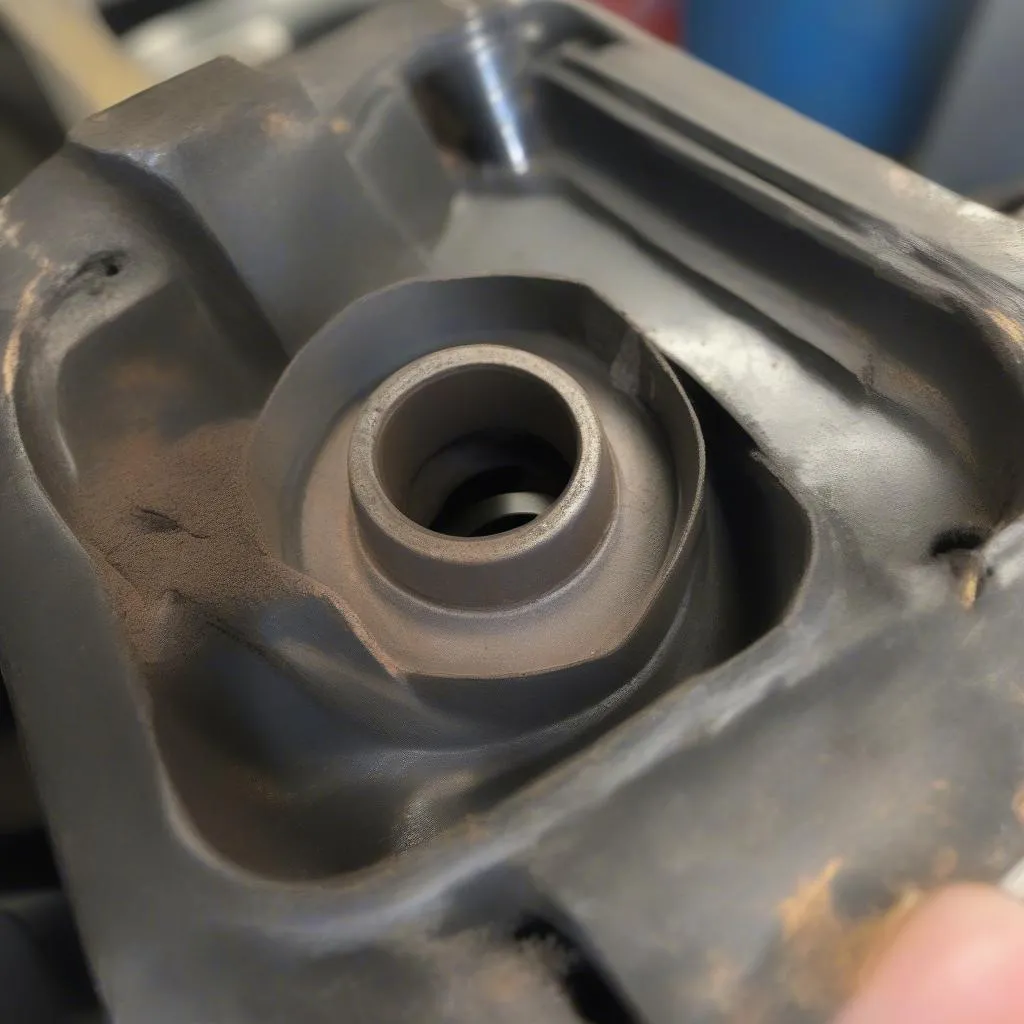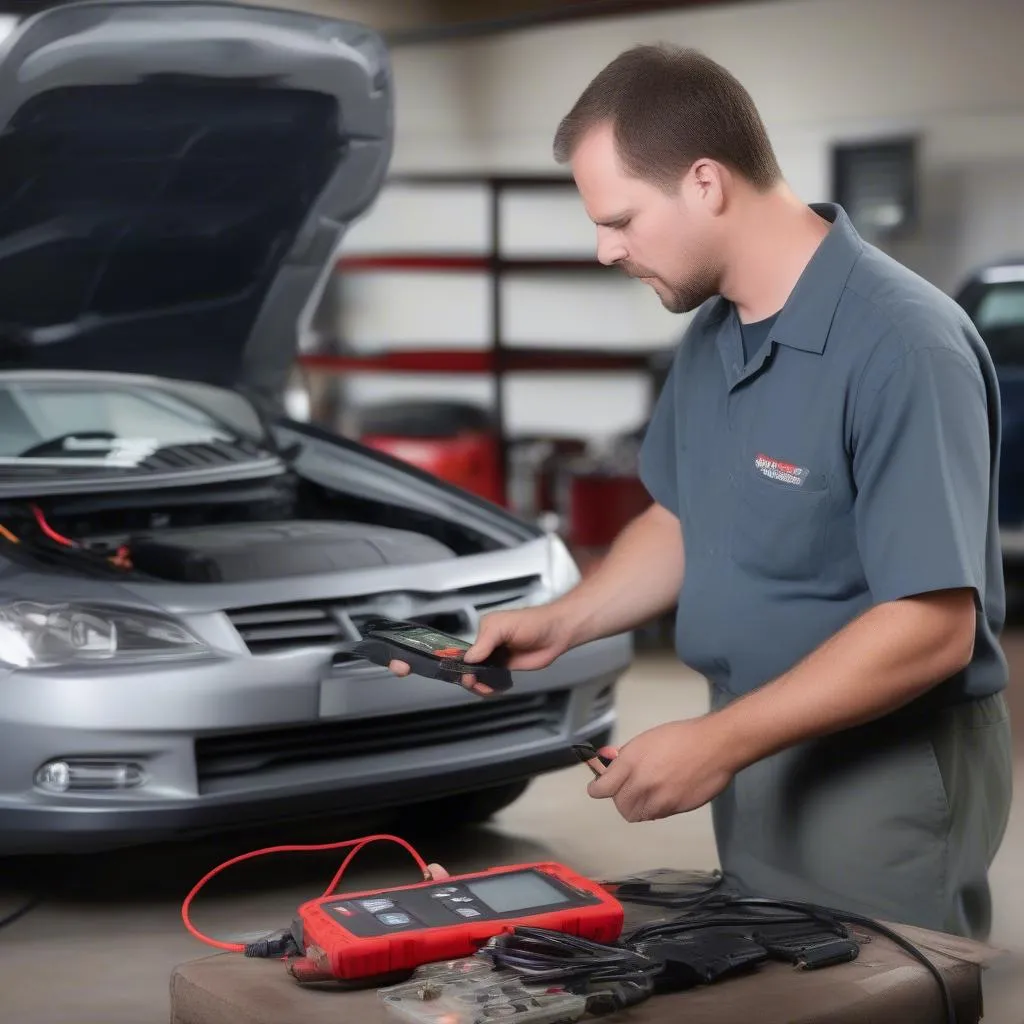Picture this: you’re cruising down Route 66, the open road beckoning, wind in your hair. Suddenly, your trusty Ford F-150 starts to shudder. That low rumble quickly escalates to a full-blown engine vibration that has you pulling over, fearing the worst. What’s going on?
As a seasoned mechanic specializing in European car diagnostics, I’ve seen my fair share of engine vibrations. Let’s dive into the common culprits and help you understand this shaking situation.
Deciphering the Shakes: What Does an Engine Vibration Mean?
Before we start throwing around terms like “spark plugs” and “engine mounts,” let’s define what we mean by “engine vibration.” This isn’t just a slight tremor you feel through the steering wheel; it’s a more pronounced shaking or shuddering that originates from under the hood.
From a mechanic’s perspective, an engine vibration signals an imbalance somewhere in the intricate dance of components that make your car go “vroom.” Technically, it often points to an issue with the engine’s rotational forces not being properly absorbed or dampened. Economically speaking, ignoring these vibrations can lead to costlier repairs down the road.
Why is My Engine Vibrating? Let’s Troubleshoot!
There are a handful of usual suspects when it comes to engine vibrations. Here are some of the most common causes:
1. Worn Out Engine Mounts
Think of engine mounts as the shock absorbers for your engine. These sturdy components prevent the engine’s vibrations from transferring to the rest of your car. Over time, they can wear down, crack, or even break, leading to noticeable vibrations, especially when you start the car or accelerate.
2. Spark Plug Issues
Spark plugs ignite the air-fuel mixture in your engine cylinders. If a spark plug is faulty, fouled, or improperly gapped, it can disrupt the combustion process. This often leads to an engine misfire, which you’ll feel as a vibration.
3. Fuel System Problems
A clogged fuel filter or a malfunctioning fuel injector can disrupt the steady flow of fuel to your engine. This can cause the engine to run lean (not enough fuel) or rich (too much fuel), leading to vibrations and performance issues.
4. Vacuum Leaks
Remember those hoses snaking around your engine? They’re part of the vacuum system, which is crucial for engine performance. A leak in this system can disrupt airflow, resulting in rough idling and vibrations.
5. Internal Engine Problems
Now, for the more serious (and potentially expensive) causes. Internal engine problems like worn-out bearings, a failing timing belt, or even a bent connecting rod can all manifest as severe engine vibrations.
 Worn Engine Mounts
Worn Engine Mounts
Recognizing the Symptoms: When to Worry?
Engine vibrations can range from mild tremors to violent shaking. Here are some common scenarios and what they might indicate:
- Car vibrates at idle: Often a sign of worn engine mounts or a vacuum leak.
- Vibration when accelerating: Could point to spark plug issues, fuel system problems, or a failing catalytic converter.
- Shaking at high speeds: Worn tires, unbalanced wheels, or alignment issues can cause vibrations at higher speeds, but a failing transmission or driveshaft could also be the culprit.
A Word from the Experts:
“Ignoring engine vibrations is like ignoring a toothache – it’s only going to get worse,” says renowned German automotive engineer, Dr. Hans Schmidt, author of “The Symphony of Automotive Mechanics.” “Early diagnosis and repair can save you significant headaches and expenses down the road.”
What to Do When Your Engine Vibrates?
If you’re experiencing engine vibrations, don’t panic! First, try to pinpoint when and how the vibrations occur. Is it at idle, during acceleration, or at specific speeds? This information will be valuable when you take your car to a trusted mechanic.
Using a professional-grade diagnostic scanner, like those used by dealerships for European cars, can be invaluable in identifying the root cause of the vibrations. These scanners can read your car’s computer, detect misfires, and identify issues with sensors and other components.
 Mechanic Using Diagnostic Scanner
Mechanic Using Diagnostic Scanner
FAQs: Your Engine Vibration Questions Answered
Q: Can bad motor mounts cause shaking in the steering wheel?
A: Absolutely. Worn motor mounts can transmit engine vibrations to the chassis, which you might feel through the steering wheel, especially when accelerating or decelerating.
Q: My car vibrates when I accelerate over 50 mph. What could be wrong?
A: This could be a sign of several issues, including worn spark plugs, a clogged fuel filter, or even a problem with your car’s axles or CV joints.
Q: My car shakes when idling, but the check engine light isn’t on. What should I do?
A: While a check engine light is a clear indicator of a problem, not all engine issues trigger it. A vibrating engine, even without a warning light, warrants a professional inspection.
Keep Your Engine Humming Smoothly
Engine vibrations are a common problem, but understanding the potential causes and seeking timely repairs can prevent costly damage and keep your car running smoothly for miles to come. Remember, a little preventative maintenance goes a long way!
Looking for more car maintenance tips or have a burning question about your vehicle’s quirks? Check out these related articles:
Need expert help diagnosing those pesky engine vibrations? Contact us via Whatsapp at +84767531508. Our team of automotive specialists is available 24/7 to help you get to the bottom of your car troubles!